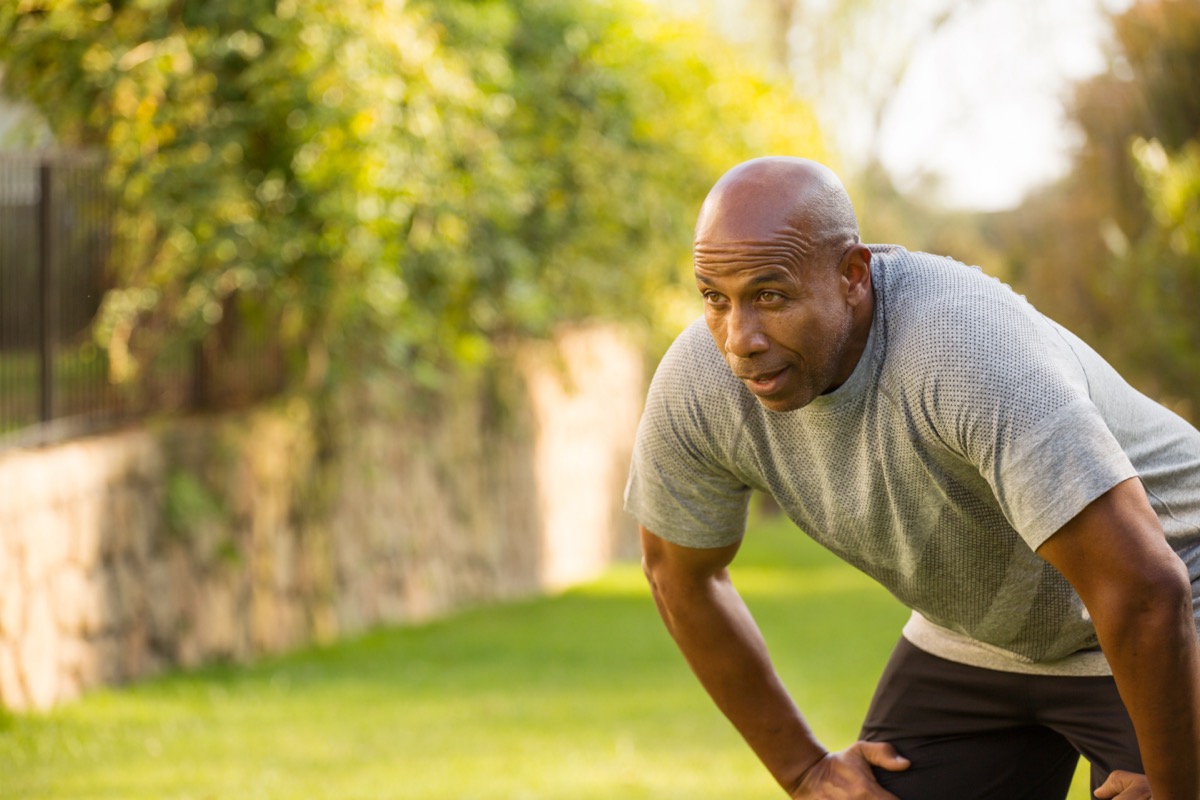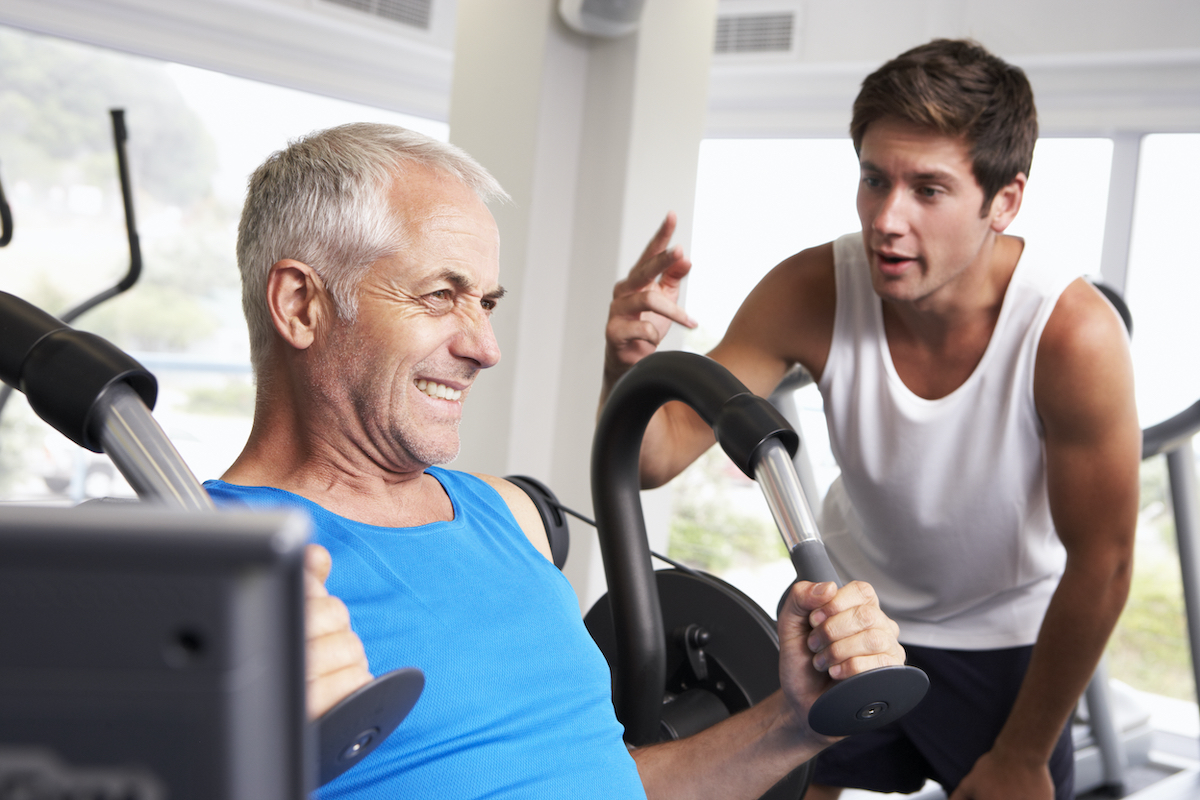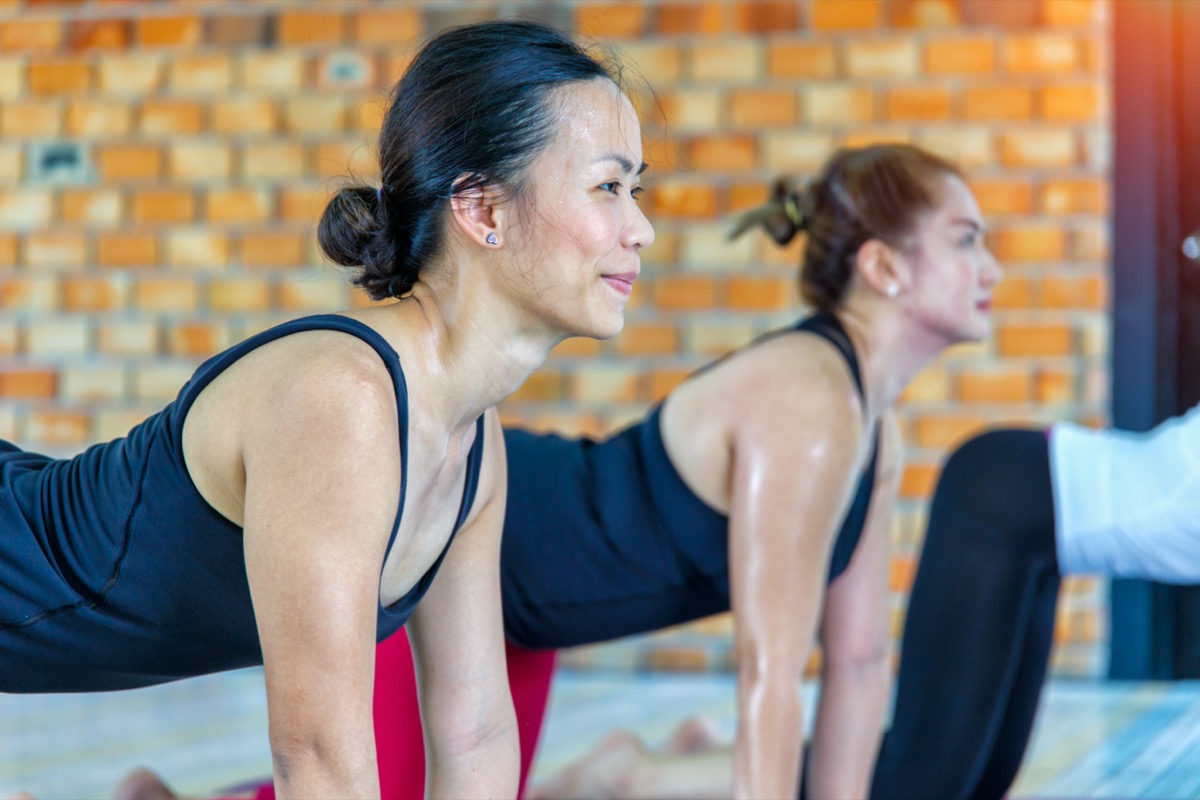Over 60? Don't Make These Exercise Mistakes, Say Experts

Getting fit can feel like a difficult task at any age, but it can feel particularly challenging in the latter half of our lives, when our bodies slow down and develop more aches and pains. But it's simply a fact that sticking to a strong and consistent exercise regimen well into old age is one of the most important things you can possibly do to stay sharp—physically as well as mentally. For instance, a recent study published in the journal Neurology found that just six months of steady aerobic exercise helped a group of older adults (average age: 66 years old) perform significantly better on thinking and memory tests.
"Our study showed that six months' worth of vigorous exercise may pump blood to regions of the brain that specifically improve your verbal skills as well as memory and mental sharpness," comments study author Marc J. Poulin, Ph.D., D.Phil., from the Cumming School of Medicine at the University of Calgary in Alberta, Canada. "At a time when these results would be expected to be decreasing due to normal aging, to have these types of increases is exciting."
Poulin adds that it's never too late in life to adopt a fitness routine. "As we all find out eventually, we lose a bit mentally and physically as we age. But even if you start an exercise program later in life, the benefit to your brain may be immense," he explains.
Of course, all of that doesn't mean a 62-year old should be following the same gym regimen as a 24-year old. There are certain factors every older adult should consider when deciding on a new workout routine. With that in mind, keep reading to learn more about the top exercise mistakes you shouldn't make after 60. And for some things you should definitely do, don't miss this One Life-Changing Exercise Trick for People Over 60, Say Experts.
You're Only Lifting Small Weights

"Avoid thinking you just need to use little weights. Gone are the days of hitting 60 and now using the small pink dumbbells for everything because they may not be building strength like you think," explains Alyssa Kuhn, PT, Director of Physical Therapy at Keep The Adventure Alive. "Oftentimes as we get older, some begin to shy away from heavier weights in fear of becoming injured or hurting their joints. In reality, we can't build muscle strength without a challenge. If the last 2-3 reps don't feel challenging when you are attempting strength training, (bearing in mind form doesn't break down of course!) you likely aren't building strength."
According to Shaun Zetlin, PT, of Zetlin Fitness, you should use weights that will make you reel challenged for six to ten reps across two sets. "The benefits of heavier weights are that they stimulate muscle growth, improve coordination, help reduce your biological age through hormone stimulation, and reduce sarcopenia (loss of muscle)," he explains. And for more great exercise advice, don't miss The Secret Mental Trick for Getting a Lean Body, Say Experts.
You're Not Stretching Enough

Mobility fades with time and as we grow older, which is why it's so important for physically active older adults to incorporate stretching into their daily routine. According to Jorden Gold, founder and Chief Stretch Officer of Stretch Zone, a regular stretching regimen can help older adults reduce lower back pain, improve posture, increase energy levels, and reduce the risk of falls.
One study published in the International Journal of Health Sciences reports that a 10-week lower-body stretching course helped a group of elderly participants greatly improve their balance and reduce the occurrence of falls.
"If there's one thing seniors should never neglect to do as they continue to age—it's stretching," says Gold. "As we age, our range of motion deteriorates, and our muscles and joints lose their strength. For this reason, it can be extremely challenging for older adults to maintain their mobility. Thanks to stretching, seniors can experience improved flexibility, increased strength, and enhanced blood circulation." If you're in the market for more great exercises that will challenge your balance and coordination, don't miss Your New Go-To Exercises for Balance and Stability as You Age.
You're Not Giving Yourself Extra Rest Time

Rest days are just as important as workout days for any avid exerciser, but rest is particularly essential for older adults. It's admirable to want to get in the gym five or six days per week, but working out too often can do far more harm than good.
Still skeptical? Consider the perspective of Robert Herbst, 19-time World Champion Powerlifter: "One mistake people make in exercising after 60 is they do not let themselves have enough time to recuperate between workouts. It takes longer to recover than it did even when they were in their 50s and certainly their 40s. One needs to listen to their body and know when to take a break. This should not be confused with laziness. On off-days one should still stay active by walking or stretching to stay fit and promote recovery, but they should make sure their body has recovered before they push it again, especially after strength training."
Research published in Medicine & Science in Sports & Exercise found that older athletes experience much slower muscle regeneration following intense exercise than younger adults. So you may need more rest following each workout than you did at a younger age.
You're Not Consulting with Your Doctor

Exercise is inherently inspiring. You may be inclined to continually intensify your workouts as you start exercising more and more, but remember to consult a physician before trying a new routine or approach. The National Institute on Aging recommends that older adults ask their doctors three main questions before starting a new workout: "Are there any exercises or activities I should avoid?", "Is my preventive care up to date?" (Your physician may recommend a test or checkup), and "Do any of my health conditions affect my ability to exercise?"
"Whether someone is an avid trainer or beginner, visiting a physician before starting a new routine or performing any intensive physical activity is a must," says Stephan Baldwin, Founder of the Assisted Living Center. "At any stage of life, we're prone to injuries caused by exercise, but the chances of this happening beyond our 60s is higher. These injuries can negatively impact someone's quality of life, so it's essential to be vigilant and responsible about it."
You're Missing Out on Everyday Exercise Opportunities

We've all been conditioned to think of "exercise" as something that only happens at the gym or when we're wearing a workout outfit, but day-to-day activities also represent a great and easy way to stay in shape. In simpler terms, if given the choice, always opt for a little bit of movement over stagnation.
"Fire the gardener, do it yourself," says Cathy Spencer-Browning, VP of Training & Programming at MOSSA, a group fitness provider. "Carry your own shopping bags, park far away from the entrance to the shop and get there in a hurry, take the stairs—every single time, walk around while on the phone, do your house chores the old-fashioned way—getting down on your knees. In any and every way chose movement over sitting. This will build everyday strength and a solid basis to build upon." And for some exercises to avoid, don't miss this list of The Worst Exercises You Can Do After 60.








